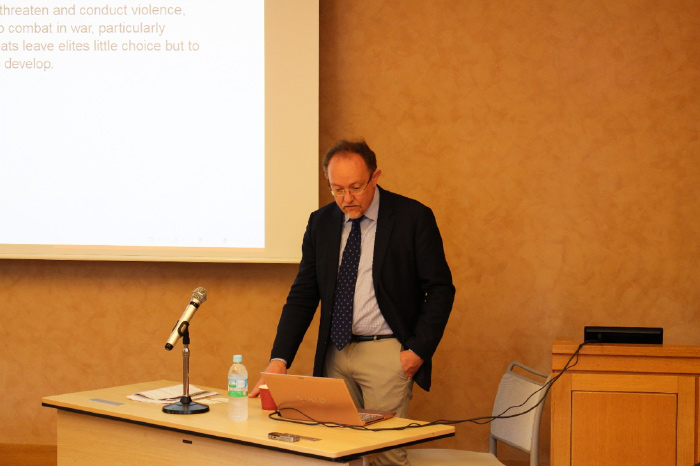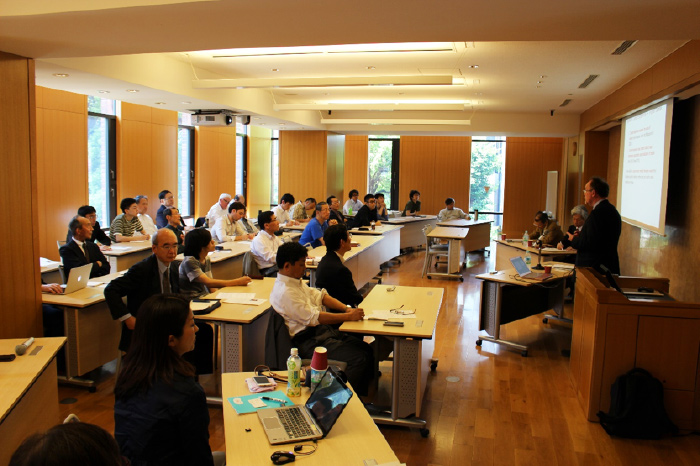SSU Forum / The 9th Yamakawa Kenjiro Memorial Lecture with Professor Steven Wilkinson
| Date: | Friday, May 19 2017, 11:00 - 12:30 |
|---|---|
| Venue: | Seminar Room, 3rd Floor, Ito International Research Center |
| Subject: | “War and Political Change” |
| Lecture: | Steven Wilkinson, Professor and Chair, Department of Political Science, Yale University |
| Comment: | Professor Ken Ishida (Chiba University) |
| Language: | English |
| Co-hosted by: | Security Studies Unit, Policy Alternatives Research Institute, the University of Tokyo The Whitney and Betty MacMillan Center for International and Area Studies at Yale FUTI (Friends of UTokyo, Inc.) |
The Security Studies Unit was honoured to host the 9th Yamakawa Kenjiro Memorial Lecture delivered by Steven Wilkinson, Nilekani Professor of India & South Asian Studies and Chair at the Department of Political Science, Yale University. This lecture was co-hosted by The Whitney and Betty MacMillan Center for International and Area Studies at Yale, and by FUTI (Friends of UTokyo Inc.).
The event was opened by Kiichi Fujiwara, professor of International Relations at the University of Tokyo, Director of the Policy Alternatives Research Institute (PARI) and of the SSU. Professor Fujiwara introduced Professor Wilkinson as a political scientist with a particular focus on the modern history of India, who is particularly interested in the relations between large-scale historical events and individual destinies.
He also introduced Professor Ken Ishida, a distinguished IR scholar and Professor of international politics at Chiba University, who acted as discussant.

Professor Wilkinson opened his lecture by thanking the host, and immediately proceeded to illustrate how he and his co-author Saumitra Jha (Stanford GSB) arrived at the topic of “war and political change”. The question on which this current project is based is understanding how war affects not only states, but individuals and how those individuals perform in revolutionary changes, especially in episodes of domestic political violence, once they return home from military campaigns.
This study evaluates the role of veterans in revolutionary movements and radical political change. Is it war that causes political change, or, more plainly, militaries are more likely to recruit people who already have an inclination towards political violence?
Professor Wilkinson started from the well-known episode of the assault on the Bastille, one of the key events of the French Revolution, which took place on 14th July 1789. The initial attacks from the crown failed. However, among the revolutionaries was a certain Claude Marneur, a former artillerist in the Royal Army who had acquired combat experience in the American War of Independence (1775-1783). Under his leadership and after having brought up a cannon, the fortress surrendered. This example illustrates the question: how is previous military experience relevant in post-war transformation and in post-war political violence? Violence requires skills.

These questions have been approached by a number of scholars in the past. Many studies are based on interviews with veterans, but this approach has many drawbacks. The psychological processing and verbalisation of memories regarding one’s own role in political violence can be mediated by many intervening factors. Professor Wilkinson’s and his co-author’s approach is therefore strongly quantitative, based on the analysis of available data regarding several cases studies.
The first one concerns the role played by WWII veterans in the interethnic violence which occurred during the partition of India (1947). Hundreds of thousands soldiers from the subcontinent fought under the British against the Axis powers during 1939-1945 in numerous theatres of operations. It is historically well-known that many of them were actively involved in the interethnic violence which erupted in India and Pakistan after the partition. The questions are: were they disproportionately involved in comparison to other groups? Was their participation statistically relevant? Professor Wilkinson illustrated how his research has proceeded through various stages of data acquisition, analysis, and interpretation. Information about the Indian Army in WWII is relatively abundant and accessible about many aspects of the veterans’ experience: their place of origin, physical condition, ethnic and religious background, combat experience. It is therefore possible to create databases with these information and cross them with data concerning the eruption of political violence in 1947. It appears that a correlation exists between areas of more intense violence and those where veterans were residing, especially those with the most extensive combat experience during the war.
A second case concerns the presence of veterans of the French Royal Army returning from the American Civil War in the episodes of revolutionary violence in the first stages of the French Revolution (1789-1792), as already anticipated above. Here as well there is a remarkable amount of preserved records about the origin, physical condition, combat experience of numerous soldiers, and their involvement in revolutionary actions. There appears to be a correlation between the presence of those veterans and the outbreak of rebellions in certain areas of France, as well as the spread of more democracy-inclined political ideas, as reflected in the content of the cahiers des doléances filed from those same regions, or the creation of political clubs. Because the regiments which France sent to fight in the American war did not display any significant deviation from the rest of the French army which remained in the metropole, one can infer that it was combat experience, rather than other factors, which transformed these soldiers into a more proactive political force.
In the ensuing discussion, Professor Ishida discussed the implications of these findings as well as overlapping research trajectories, underlining the originality of an approach which tries to study the roles of individuals qua individuals as opposed to individuals as members of specific groups, where political action is usually attributed to the groups or their outstanding leaders. The lecture also posed the challenge of opening numerous stimulating questions about how the direct experience of violence does not necessarily lead to the enhancement of anti-violence or pacifist political attitudes.

